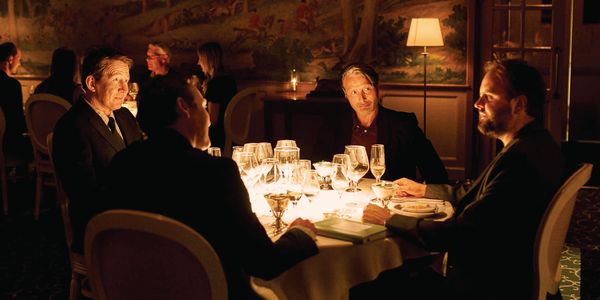London Film Festival 2020: ANOTHER ROUND

Andrew Young is a freelance writer on film and culture…
Thomas Vinterberg, one of Denmark’s most renowned and acclaimed filmmakers, returned with aplomb at this year’s London Film Festival. Another Round, on the back of strong reviews and a place as part of the Cannes Official Selection, took home Best Film from this year’s LFF, voted for by audiences for the first time. It is telling, perhaps, that Vinterberg’s film struck a chord with so many people.
Written with his The Hunt collaborator Tobias Lindholm, Vinterberg’s film follows four middle-aged teachers who decide to liven up their dull existence by keeping a constant level of alcohol in their blood. The premise alone suggests a perhaps familiar arc, with a light-hearted rise for our protagonists, before an inevitable fall. Vinterberg’s film does not shock or subvert in this respect, hitting the required beats in the right order. Yet it goes to higher highs and lower lows than expected, proving both heart-achingly sad and outrageously joyous.
An Ordinary Life
Our four teachers are led by Mads Mikkelsen, who is probably now in the running for most renowned Danish actor of all time, in a magnetic performance as Martin, a history teacher decidedly lacking in enthusiasm. Martin’s life is not so much a car crash as a very dull traffic jam; he barely sees his wife, his two boys are more interested in their phones than their dad, and he’s a frankly terrible teacher. If Martin ever once cared about history and inspiring young minds, all evidence of it has now disappeared.

He is joined in his perfectly satisfactory life by three similarly middle-aged men. Tommy (Thomas Bo Larsen) is a bored gym teacher, Peter (Lars Ranthe) is a bored music teacher, and Nikolaj (Magnus Millang) is a bored psychology teacher. They’re all straight white men with comfortable jobs, with their privilege an in-built part of Vinterberg’s dissection of their lives. He both exposes the mental turmoil underneath the surface (some really are just bored, but some are actually deeply depressed), and probes what effect prolonged ease and privilege can have.
The effect, it seems, is an absence of romance. Not only are their marriages either failed or stale, but they no longer have a romantic’s outlook on life. They are not amazed by the possibilities the world offers, or in love with its wonders, but fairly unaware of the world around them. With their lives sapped of the vigour of youth, now spending their days watching their students have an awful lot more fun than they are, Nikolaj comes up with a plan.
To Drink or Not to Drink?
Nikolaj’s idea, based on a Norwegian philosopher’s spurious assertion that we are all born with a ‘deficit’ of alcohol in our bloodstream, is for the four men to keep drinking just a little bit, all the time. This way, they permanently feel like they have had 1 or 2 glasses of wine, but are never what one would call drunk. The hope is that the alcohol will loosen them up and give them some much-needed vitality both at home and in the classroom.
Unsurprisingly, it works until it doesn’t. Vinterberg has a lot of fun with the characters on the way up, bringing low-key elation to scenes where Martin miraculously becomes a good teacher again and both he and his students are happy once more. There is humour here, too, with a nice warm camaraderie between all four actors.

That said, the idea of four friends getting drunk together for two hours does suggest a far jollier enterprise than we actually get here. The entire thing walks a tonal tightrope, delicately weaving hilarious moments into a decidedly melancholy whole. It is worth remembering that our heroes do not start drinking just for fun, but to improve their lives, to alleviate their woes. That this is necessary points to the dark heart of the film.
If Vinterberg and Lindholm do a good job with the amusing side of the drinking experiment, then they really up their game with the downsides. Even in quiet scenes, the film moves forward with disaster looming. One perfectly-judged scene sees Martin, pushing the limits of the experiment, stumble around the staff room, narrowly avoiding his colleagues before colliding with the wall. It’s like watching a car crash in slow motion, Martin spiralling out of control slowly but surely.
The mixture of fun and pain Vinterberg conjures is entirely appropriate for a film about alcohol, yet the film is not wholly successful if judged as a dissection of drinking culture. There is no nuance in its portrayal of the teens, for example. There is no discussion of peer pressure, of the seeming inability to stage social gatherings around alcohol, or of the effect of alcohol on the young mind and body. All the students here are drunk, rowdy and joyous. Another Round is supposedly about drinking, but it does not treat the subject with huge amounts of care or complexity.
Four Mid-Life Crises, Please
Perhaps this is just because Vinterberg doesn’t really care. His film is not actually that interested in drinking culture and the social issues surrounding it. The benefits and drawbacks of constant inebriation are discussed, sure, but Another Round is far more absorbed by middle-age, by the loss and rediscovery of youth. It is an ode not to drinking but to embracing the love and joy in life, at a time when you have forgotten they exist.
It is no mistake that our leads are all teachers, constantly judged in relation to the exuberant youth around them. The film opens with the students taking part in a frankly ridiculous drinking challenge, that is either exhilarating or appalling depending on your sensibilities, and Vinterberg quickly contrasts this with the drab daily routine of the teachers. They are what the young hedonists may become, and it is desperately sad.

They are bad teachers because they have lost all connection with their students just as they have lost all connection with their own youth. As the film begins they do not nurture their students’ young vitality, but resent it. When they start drinking they begin to reconnect with the students, and in turn, reconnect with their youth. They are doing something they shouldn’t again, and are embracing fun for the first time in a while.
Yet there is surely more than a bit of placebo effect going on here. When the men rediscover a passion for their jobs and the people around them, it is not just because they are drunk but because they believe that they are better versions of themselves. Their experiment gave them something to believe in again, the promise of something new and exciting. It jolted them awake from their middle-aged slumber and presented the opportunity to see the world through fresh, albeit blurry, eyes. Whether they actually needed to drink for that to be the case remains unclear.
After moving through the expected emotional beats of the drinking odyssey, Another Round then hits another gear. It really invests in its characters and becomes more and more about ageing and depression as we head towards a superb finale. After the inevitable rise and fall of their plan, what happens next to Martin, Tommy, Nikolaj and Peter is where the film can subvert expectations and tells us so much about their characters. All four get their moments in a well-balanced script, but it is Mikkelsen and Bo Larsen that get the most to do, both turning in incredibly moving performances.
The tonal balance that Vinterberg strikes throughout the film builds into a deeply satisfying whole that closes with a set-piece which gets to the heart of the film. Smartly, Vinterberg keeps the school at the centre, the graduating students partying way as their teachers look on. Yet Martin and co. now know that they have something over these carefree, hedonistic teenagers. They have lived longer and experienced more pain. They have fallen out of love with life, and back in love again. They know how precious it is, and to make the most of it.
Another Round is at its heart a film about middle-age. What are the best films about mid-life crises, either comedic or tragic? Let us know in the comments!
Watch Another Round
Does content like this matter to you?
Become a Member and support film journalism. Unlock access to all of Film Inquiry`s great articles. Join a community of like-minded readers who are passionate about cinema - get access to our private members Network, give back to independent filmmakers, and more.
Andrew Young is a freelance writer on film and culture from Manchester, UK. If you like his writing, Andrew also runs a more informal film website at reeltime.blog













